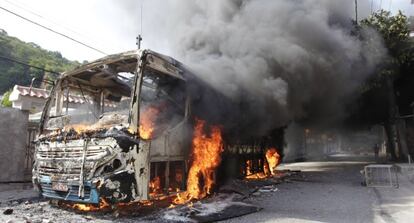Residents of Rio’s ‘favelas’ rail against violence caused by police occupation
Indiscriminate searches and deaths of bystanders in shantytowns prompt communities to react

For the past few months, the residents of Rio de Janeiro’s notorious favelas have taken to the streets to protest the wave of violence that has erupted since police squads began occupying their neighborhoods.
The residents complain that the indiscriminate searches by police and the deaths of innocent people caught in gun battles between officers and drug traffickers have made life unbearable in Rio’s hilltop shantytowns.
As part of a security plan, the Rio state government has called out police and other security forces to take over the favelas in an effort to break up drug-trafficking networks and stem the tide of crime that reaches to other areas. But the residents of these communities have said they are fed up with the effects and results of these occupations.
In the past weeks, images published in newspapers show large groups of people putting up roadblocks and setting fire to scores of buses and other public transportation vehicles in their communities. Those taking part in the violent protests are mothers with children in their arms, elderly residents, and unarmed young people, who say they are angry with the government for treating them as second-class citizens.
The death toll in Rio de Janeiro state since 2006 stands at 43,165
In one of the latest incidents, residents of the Caramujo shantytown, located in Rio’s satellite city of Niteroi, set fire to vehicles and blocked roads on Friday to protest two killings that occurred in the area. As he was leaving an Easter week service at the Nossa Senhora de Nazareth Catholic Church, Anderson Santos Silva, 21, was fatally shot after he was caught in gunfire between police and drug traffickers. His sister was seriously wounded.
In another incident, a young man, Emanoel Gomes, was killed after he was run over by a police armored vehicle.
Over the past eight years there have been 35,879 violent deaths in Rio de Janeiro state, according to the NGO Rio de Paz, which compiled the figures from official statistics. The group also reported an additional 1,169 murders stemming from robberies, 5,677 involving police interventions, and 285 deaths from injuries sustained in different incidents.
In all, the total death toll since 2006 stands at 43,165, but Rio de Paz officials said that figure does not include the more than 38,000 people reported missing and the more than 31,000 attempted murders.
In the last few days, the residents of Complexo da Maré shantytown, which was recently taken over by Brazilian police, were outraged after two people suspected of cooperating with drug traffickers were found dead during the initial phase of the occupation. Instead of providing security, they claim that the police are making it more difficult for them to live in peace.
Tu suscripción se está usando en otro dispositivo
¿Quieres añadir otro usuario a tu suscripción?
Si continúas leyendo en este dispositivo, no se podrá leer en el otro.
FlechaTu suscripción se está usando en otro dispositivo y solo puedes acceder a EL PAÍS desde un dispositivo a la vez.
Si quieres compartir tu cuenta, cambia tu suscripción a la modalidad Premium, así podrás añadir otro usuario. Cada uno accederá con su propia cuenta de email, lo que os permitirá personalizar vuestra experiencia en EL PAÍS.
¿Tienes una suscripción de empresa? Accede aquí para contratar más cuentas.
En el caso de no saber quién está usando tu cuenta, te recomendamos cambiar tu contraseña aquí.
Si decides continuar compartiendo tu cuenta, este mensaje se mostrará en tu dispositivo y en el de la otra persona que está usando tu cuenta de forma indefinida, afectando a tu experiencia de lectura. Puedes consultar aquí los términos y condiciones de la suscripción digital.








































